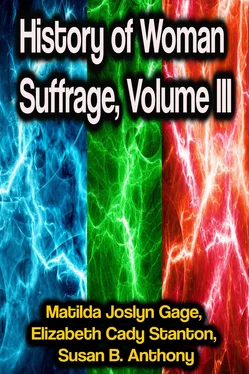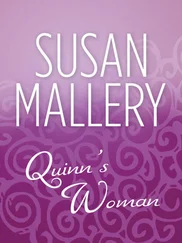It is a curious anomaly that the movement for national woman suffrage in our country is most obstructed by women, and that even where the men have doubts, their natural admiration for the gentler sex almost converts them into champions. Certain it is that the Declaration of Rights of the Women of the United States that the National Woman Suffrage Association presented to the vice-president, Mr. Ferry, while he was surrounded by foreign princes and potentates and by the governors of most of the States of the union, faced at the same time by a countless mass of American and foreign visitors—certain it is, we repeat, that when this altogether unique paper was presented by Miss Susan B. Anthony and her sisters, it became a record in the minds and memory of all who witnessed the strange proceeding. And it is a very well written statement, and no doubt one hundred years hence it will be read with an interest not less ecstatic than the enthusiasm of its present pioneers; for, in the interval, these advanced women may have won for their withholding sisters the entire list of male prerogatives. What adds to the force of the present woman suffrage party is the dignity, intelligence and purity of its participants. The venerable Lucretia Mott; the honest, straightforward Susan B. Anthony; the cultivated Ellen Clark Sargent (wife of the California senator); the beloved Elizabeth Cady Stanton, and indeed all the names attached to the declaration command our respect. Whatever we may think of the points of the declaration itself, with all our sincere admiration of these gentlewomen, increased by the knowledge everywhere that they are ardent republicans, we fear that their weakness, to employ a paradox, consists in their strength, or, in other words, that it is difficult to induce even the most benevolent and sympathetic observer to believe that they are really as much persecuted and oppressed as they claim to be. When the colored man demanded his rights they were given to him because these rights in republican constitutions were regarded as inherent, and also because he had reciprocal duties to discharge, and heavy burdens to carry, and when the Southern confederate demanded restitution of his rights, he rested his claim upon the double basis that he had earned forgiveness by his bravery, and that political disfranchisement did not belong to a republican example. Fortunately or unfortunately, it is very different with the ladies; and so when they come forward insisting upon rights heretofore accorded to men alone, they must encounter all the differences created by the delicacy of their own sisters and the reverence and love of the men, and the hard fact that these two influences have made it heretofore impossible for women to descend to the arena of politics. Having said this much, we present a few of the cardinal points of the woman's declaration of rights laid before the august memorial centennial celebration last Tuesday, July 4, 1876.—[Philadelphia Press , July 15.
On July 19, the Citizens' Suffrage Association, of Philadelphia, joined with the National Association in commemorating the first woman's rights convention called by Lucretia Mott and Elizabeth Cady Stanton, at Seneca Falls, N. Y., July 19, 1848—thus celebrating the twenty-eighth anniversary of that historic event. The meeting was presided over by Edward M. Davis, president of the association, son-in-law of Lucretia Mott, and one of the most untiring workers in the cause. The venerable Lucretia Mott addressed the meeting, and Miss Anthony read letters from several of the earliest and most valued pioneers of the movement:
Tenafly, New Jersey, July 19, 1876.
Lucretia Mott— Esteemed Friend : It is twenty-eight years ago to-day since the first woman's rights convention ever held assembled in the Wesleyan chapel at Seneca Falls, N. Y. Could we have foreseen, when we called that convention, the ridicule, persecution, and misrepresentation that the demand for woman's political, religious and social equality would involve; the long, weary years of waiting and hoping without success; I fear we should not have had the courage and conscience to begin such a protracted struggle, nor the faith and hope to continue the work. Fortunately for all reforms, the leaders, not seeing the obstacles which block the way, start with the hope of a speedy success. Our demands at the first seemed so rational that I thought the mere statement of woman's wrongs would bring immediate redress. I thought an appeal to the reason and conscience of men against the unjust and unequal laws for women that disgraced our statute books, must settle the question. But I soon found, while no attempt was made to answer our arguments, that an opposition, bitter, malignant, and persevering, rooted in custom and prejudice, grew stronger with every new demand made, with every new privilege granted.
How well I remember that July day when the leading ladies and gentlemen of the busy town crowded into the little church; lawyers loaded with books, to expound to us the laws; ladies with their essays, and we who had called the convention, with our declaration of rights, speeches, and resolutions. With what dignity James Mott, your sainted husband, tall and stately, in Quaker costume, presided over our novel proceedings. And your noble sister, Martha C. Wright, was there. Her wit and wisdom contributed much to the interest of our proceedings, and her counsel in a large measure to what success we claimed for our first convention. While so many of those early friends fell off through indifference, fear of ridicule and growing conservatism, she remained through these long years of trial steadfast to the close of a brave, true life. She has been present at nearly every convention, with her encouraging words and generous contributions, and being well versed in Cushing's Manual, has been one of our chief presiding officers. And my heart is filled with gratitude, even at this late day, as I recall the earnestness and eloquence with which Frederick Douglass advocated our cause, though at that time he had no rights himself that any white man was bound to respect. I marvel now, that in our inexperience the interest was so well sustained through two entire days, and that when the meeting adjourned everybody signed the declaration and went home feeling that a new era had dawned for woman. What had been done and said seemed so preëminently wise and proper that none of us thought of being ridiculed, ostracised, or suspected of evil. But what was our surprise and chagrin to find ourselves, in a few days, the target for the press of the nation; the New York Tribune being our only strong arm of defense.
Looking over these twenty-eight years, I feel that what we have achieved, as yet, bears no proportion to what we have suffered in the daily humiliation of spirit from the cruel distinctions based on sex. Though our State laws have been essentially changed, and positions in the schools, professions, and world of work secured to woman, unthought of thirty years ago, yet the undercurrent of popular thought, as seen in our social habits, theological dogmas, and political theories, still reflects the same customs, creeds, and codes that degrade women in the effete civilizations of the old world. Educated in the best schools to logical reasoning, trained to liberal thought in politics, religion and social ethics under republican institutions, American women cannot brook the discriminations in regard to sex that were patiently accepted by the ignorant in barbarous ages as divine law. And yet subjects of emperors in the old world, with their narrow ideas of individual rights, their contempt of all womankind, come here to teach the mothers of this republic their true work and sphere. Such men as Carl Schurz, breathing for the first time the free air of our free land, object to what we consider the higher education of women, fitting them for the trades and professions, for the sciences and arts, and self-complacently point Lucretia Mott, Maria Mitchell, Harriet Beecher Stowe, Susan B. Anthony, to their appropriate sphere, as housekeepers with a string of keys, like Madam Bismark, dangling around their waists.
Читать дальше












